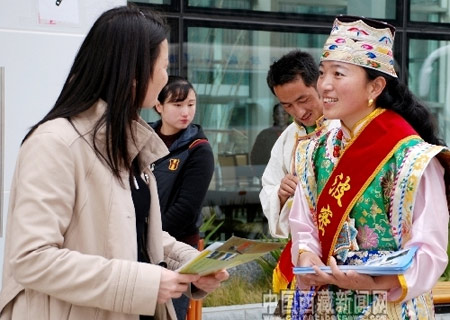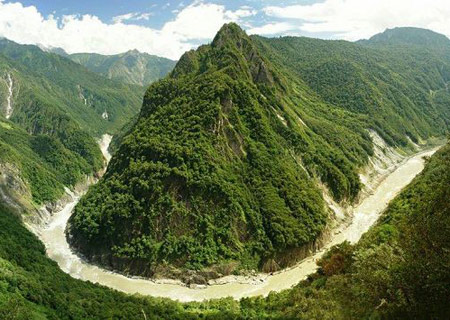Ticket prices for scenic spots in SE Tibet
2009-09-29 17:31 BJT
BEIJING, Sept. 24 (Xinhuanet) -- From October to March, ticket prices for scenic spots in southeast Tibet‘s Nyingchi Prefecture will drop substantially, according to the local tourism bureau on Wednesday.
The move aims to attract more tourists to the area in the winter time, said Wang Jun, director of the Tourism Bureau of Nyingchi Prefecture.

A staff from the Tourism Office of Bome County, southeast Tibet‘s Nyingchi Prefecture, talks to a tourist at the Nyingchi Airport. From October to March, tickets for scenic spots in southeast Tibet‘s Nyingchi Prefecture will drop substantially, according to the local tourism bureau on Wednesday. (Xinhua Photo)
Meanwhile, during the eight-day National Day holiday which starts on Oct. 1, hotels in Nyingchi will give a 30 to 50 percent discount. Tickets to major tourist attractions will fall 50 percent and airlines will give individual passengers a ticket discount of 20 to 50 percent and a greater discount to group tourists.
Nyingchi currently has 145 hotels, including five three-star ones and 14 two-star ones. With 4,275 rooms and 7,825 beds, Nyingchi is capable of receiving 2.5 million tourists each year.
Known as the "Oriental Switzerland," Nyingchi has the most agreeable climate, and the richest natural and cultural landscapes in Tibet. It is also considered the best destination for travelers to the region.

Basum Lake in southeast Tibet‘s Nyingchi Prefecture is seen in this file photo. (Photo: CRIonline)
Major tourist attractions in Nyingchi include the Namjagbarwa Peak -- one of China‘s most beautiful peaks, the Yarlung Tsangpo Grand Valley, and Basum Lake, living around which are various species of wildlife including leopards, bears, goats, and musk deer.
Nyingchi is also the native place for some historical figures, including the first Tibetan king and the 13th Dalai Lama Takai Gyamco.

The Yarlung Tsangpo Grand Valley the Yarlung Tsangpo Grand Valley. (Xinhua Photo)
Nyingchi is also the habitat for minority ethnic groups such as the Gongbo Tibetan, Menba and Luoba ethnic groups. Their traditional lifestyles and unique folk customs have attracted quite a few tourists.
Editor: 盧佳穎 | Source: Xinhuanet

 Mail
Mail Share
Share Print
Print


 Video
Video









 2009 China Central Television. All Rights Reserved
2009 China Central Television. All Rights Reserved